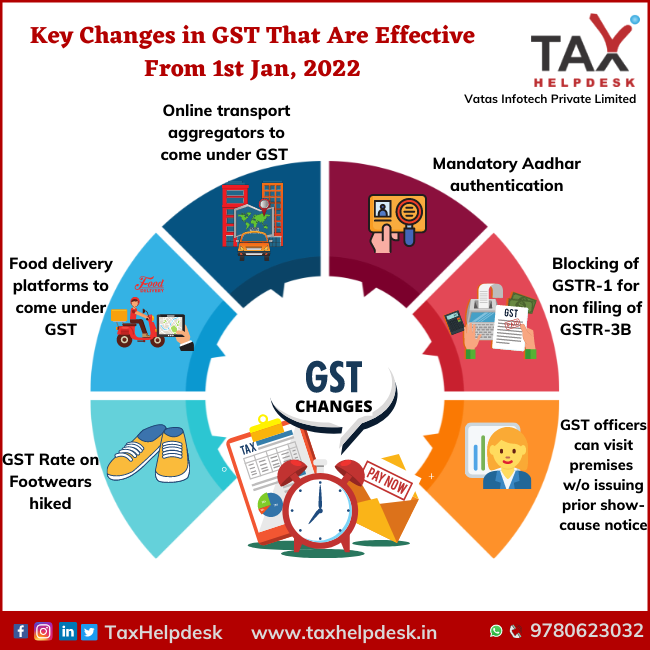From new year, 2022 there are a host of key changes in GST which are applicable from 01.01.2022. These changes include the goods and services tax rate changes on footwear, liability on e-commerce operators to pay tax on services provided, etc. We will discuss all these changes one by one in detail:
GST Rate on Footwears hiked
The prices of footwear has been hiked from 1st January, 2022 because the footwears will now attract goods and services tax @12% instead of 5%. Having stated that there will be no distinction on the basis of type and material of footwear. Further, all footwears will attract goods and services tax @12%.
Note:
Earlier, from 1st January, 2022 even the textiles products were to be hiked due to change in GST rates from 5% to 12%. However, through the 46th GST Council Meeting held on 31st December. In this meeting, Finance Minister announced that there will be no change in goods and services tax rate of textiles until further notice.
Food delivery platforms to come under GST
Another change in GST that has come into effect from 1st January, 2022 is that online food delivery platforms. These platforms are such as Swiggy and Zomato are made liable to collect and deposit goods and services tax on restaurant services supplied through them. Further, they would need to issue invoices in respect of such services.
The move comes after government estimates showed that tax loss to the exchequer. This is due to alleged underreporting by food delivery aggregators is Rs. 2,000 crore over the past two years. Making these platforms liable for goods and services tax deposits would only curb tax evasion and more goods and services tax collection by the Government.
Also Read: GST Registration on the basis of State and Turnover
Note:
There is no extra tax burden on the end consumer. This is so because the restaurants were already collecting and depositing goods and services tax to the government. Only, the compliance of deposit and invoice raising has now been shifted from restaurants to food delivery platforms.
Online transport aggregators to come under GST ambit
The services provided by online transport aggregators like Ola, Uber has also become taxable @5% GST rate, w.e.f., 1st January, 2022. On the other hand, the passenger transport services provided by auto-rickshaw or taxi drivers through offline/manual mode exempt.
Mandatory Aadhar authentication
Apart from the above changes, the other change that has come effect from 1st January, 2022. In addition, it is mandatory Aadhaar authentication for claiming goods and services tax refunds.
Blocking of GSTR-1 for non filing of GSTR-3B
GSTR-1 filing facility will be blocked if a registered taxpayer has not got submitted its filed GSTR-3B for the previous two return periods. While businesses file GSTR-1 of a particular month by the 11th day of the subsequent month. GSTR-3B, through which businesses pay taxes file in a stagger manner between the 20th-24th day of the succeeding month.
Also Read: Benefits Of Filing GST Returns On Time
So, if the taxpayer has not filed GSTR-3B for period say, November, 2021 and December, 2021. Then he will be restricted from filing of return from 1st January, 2022.
GST officers can visit premises without issuing prior show-cause notice
Another anti tax evasion change is that the goods and services tax law amend to allow GST officers to visit premises. This is in order to recover tax dues without any prior show-cause notice. In cases where taxes paid in GSTR-3B is lower based on suppressed sales volume, as compare to supply details given in GSTR-1. This move would help curb the menace of fake billing whereby sellers would show higher sales in GSTR-1 to enable purchasers to claim input tax credit (ITC). But report suppressed sales in GSTR-3B to lower goods and services tax liability.
If you want to know more about GST changes or take help of TaxHelpdesk experts, then leave a message below in the comment box or drop us a message on any of these platforms: WhatsApp, Facebook, Instagram, LinkedIn and Twitter. For tax related information and updates, you can also join our WhatsApp group and Telegram Channel.
The views of the author are persona and Taxhelpdesk does not owe any liability.



Pingback: Key Changes in GST That are Effective from Janu...